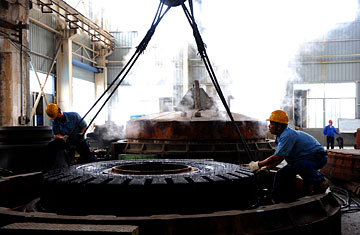
Workers produce a giant tire at the China National Tire & Rubber Guilin Corp. LTD in Guilin, in China's Guangxi Zhuang Autonomous Region, on May 24, 2009
The relationship between China and the U.S. may be the world's most complicated. While the two economies desperately need each other — China relies on exports to the U.S. to drive growth while the U.S. requires investments from China to finance its giant deficits — Beijing and Washington nevertheless routinely spar over a wide range of sensitive issues. The U.S. has accused China of manipulating its currency to unfairly promote exports, while China has openly called for the replacement of the U.S. dollar as the world's premier currency. But with so much at stake, the two nations have tried to keep their rapport cordial. In July, U.S. President Barack Obama called for "cooperation, not confrontation" with China.
Until now. A widening trade dispute threatens to ratchet up tension in the China-U.S. relationship, with potential consequences for the entire world economy. The spat began on Sept. 11, when the Obama Administration announced it will slap tariffs of as much as 35% on Chinese-made tires, effectively pricing them out of the low end of the American market. Two days later, China's Ministry of Commerce said it would start antidumping investigations against imports of some U.S. chicken products and auto parts. Though the ministry's announcement made no mention of the tire tariffs, the timing of China's action appears as an eye-for-an-eye reaction to Obama's decision. On Monday, China sought talks with the U.S. through the World Trade Organization to resolve the dispute, while in a speech in New York, President Obama defended the tire tariff, saying trade agreements must be enforced if the global trading system is to function.
Some analysts fear the ill will caused by the tariff dispute could lead to an escalating round of conflict between the two nations, souring overall U.S.-China ties. "The action taken by the U.S. government no doubt will damage the Sino-American relationship seriously at a time when mutual trust is most needed," comments Yu Yongding, an economist at the Chinese Academy of Social Sciences in Beijing. "This is indeed a very bad beginning for the Obama government in terms of cooperation" between the two countries.
The timing couldn't be worse. Policymakers and business leaders have been looking more and more to a partnership between China and the U.S to solve the world's most intractable problems, from reform of the global financial system to climate change to nuclear proliferation. Most pressing, cooperation between Washington and Beijing is seen as absolutely crucial to nurturing the budding recovery of the global economy. The two sides need to alleviate the giant economic imbalances — excessive debt and deficits in the U.S. paired with excessive savings in China — to restore the world economy to a more sustainable growth path.
Resolving the trade conflict, however, may not be easy. Both governments are stuck in the position of having to be sensitive to sentiment at home. With unemployment in the U.S. still increasing, the Obama Administration is under pressure to take more action to preserve and create American jobs. Beijing's leadership, though not elected, can also be surprisingly reactive to public opinion, and the days following Washington's tariff announcement have seen an outpouring of criticism of the U.S. decision in the Chinese press and on the blogosphere. "Americans are shameless," noted an Internet commentator. "They always blame others for their own problems." Critics accused the U.S. of sacrificing its relationship with China to domestic politics, and calls for retaliation were widespread. "The Obama administration is doing a favor for Big Labor in the U.S., but China now has to make choices of its own," blasted an editorial in the Beijing-based daily Global Times. "A trade war would be regrettable, but creating a long-term deterrent to U.S. protectionism may require retaliation."
Such sentiments raise the ugly specter of rising global protectionism. Economists have worried that governments around the world would throw up trade barriers in a quest to preserve jobs and industries, in turn undermining a global recovery. The Chinese press was quick to point out this danger as well. A commentary on the state-run news service Xinhua reminded readers that protectionism was a key cause of the Great Depression. "Smarter actions are required to prevent a repeat of that painful history," the commentary said. "The latest U.S. decision was not one of them."
The world will get an instant check on how the trade dispute could impact overall China-U.S. relations. Obama and Chinese President Hu Jintao are expected to attend next week's G-20 summit in Pittsburgh, Pa., where the world's most influential economies will tackle sticky issues like the continuation of economic-stimulus measures and improved regulation of the global financial system. "We all need to be a lot more alarmed" by the trade spat, says Michael Pettis, professor of finance at Peking University. "Rising anger makes it more difficult to cooperate." At a crucial moment for the economy, that's something the world can ill afford.
— With reporting by Jessie Jiang / Beijing
